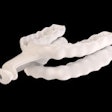
The Minnesota Board of Dentistry has refused to reconsider the license suspension of a dentist who was suspended indefinitely in March due to “gross incompetence and ignorance in the practice of dentistry,” according to a board order dated March 27.
Dr. Marko Kamel, who operated Woodbury Dental Arts in Minnesota and had his license suspended on March 7 due to incompetence in the performance of prosthodontic treatment, asked for the reconsideration, citing that the suspension created an unbearable situation that disrupted patient care and that he had placed more than 10,000 implants into patients in the state, “the vast majority of which have had excellent results,” according to the order.
“[This] has created and is causing undue hardship [for patients],” Kamel stated in the order.
However, the board determined that his suspension did not prevent his patients from seeking care at other dental practices. Furthermore, he failed to explain why or how his suspended license created an untenable situation, considering that his license had been temporarily suspended in May 2023 prior to the board ordering his suspension indefinitely, according to the board order.
“Licensee has failed to identify or support a basis in statute or rule for the Board to grant reconsideration of the March 2024 Order,” the board stated in the order.
A 60-year-old patient
After Kamel’s temporary suspension, a 60-year-old patient of his filed a complaint on September 2023 with the dental board. The man, who started seeing Kamel in 2021, had preexisting conditions including asthma, emphysema, arthritis, heart attacks, and high blood pressure, and a history of negative reactions to general anesthesia. The patient could not be completely sedated for oral surgery due to these risks, according to the March 7 order.
With the help of an oral and maxillofacial surgeon, a treatment plan that included traditional and zygomatic implants was completed. In August 2021, Kamel performed oral surgery, during which he pulled all of the patient’s remaining teeth and replaced them with three zygomatic implants and eight traditional implants, according to the order.
At the man’s three-month checkup, he complained of tenderness and a bad odor emanating from the implants. At this time, Kamel noted that a cone-beam computed tomography (CBCT) scan revealed a zygomatic that was exposed, but there was no pus. He made an appointment for the man to return to determine if an implant needed to be removed, according to the order.
In November 2021, the patient complained the implants were still sore. Kamel informed him that two of the implants had not integrated and that they needed to be removed and replaced with new ones and a bone graft. About a week later, he performed another surgery, which included replacing two implants and removing three others, according to the order.
In February 2022, the patient told Kamel his tooth felt loose and worried that the bone graft had not worked. In April, the patient reported that one of the implant screws fell out. Kamel evaluated him and told him to wait another month, after which he might need to have an implant replaced.
For months, the patient continued to complain about pain and Kamel performed other oral surgeries for failed implants. Frustrated with the continued problems, the patient went to the University of Minnesota for treatment. The university’s dental department staff performed surgery on the patient after determining he had a loose and broken provisional implant supported prosthesis, a loose pterygoid implant, fractured pterygoid implant, a soft tissue infection associated with a dehisced zygomatic implant, and periimplantitis. In the end, the man was left with no natural teeth or implants on his upper jaw, according to the order.
Over the two-year period that he was Kamel’s patient, he had at least 12 implants placed and seven implant failures, which is about a 58% failure rate. However, the exact numbers could not be verified due to inconsistent documentation, according to the order.
A female patient
In July 2023, an oral and maxillofacial surgeon at the university filed a complaint against Kamel after another patient of his came to the school for treatment. In June 2023, Kamel removed all of the woman’s natural teeth and replaced them with 12 traditional implants. She reportedly paid $39,000 for the treatment, according to the order.
In this complaint, it was alleged that Kamel prescribed a concerning amount of pain medication, failed to diagnose infection, and failed to recognize pressure necrosis, along with concerns over surgical technique and an inappropriate phone call Kamel made instructing the patient not to go to the University of Minnesota.
After receiving her implants, the woman reported being in excruciating pain. Since Kamel purportedly was unable to control her pain, she went to the hospital where she underwent imaging. It revealed possible postoperative swelling and a possible soft tissue infection stemming from the dental treatment. She was referred to the university for a dental evaluation.
The patient informed Kamel’s practice that she would be going to the university for treatment. Kamel reportedly left her a message, stating, “The way that the University of Minnesota is dealing with, ah, any complications, uh, is not something that I would approve. So, ah, [Patient 2], I would prefer if you do not take, ah, the recommendation because they are not qualified to take care of such a case,” according to the order.
She went to the university anyway, where she had to undergo surgery to have all of her protheses removed due to infection. Her postoperative diagnosis was a dental infection and sepsis; the source of infection was pressure necrosis from prostheses, bilateral canine space infection, and submental space infection. She developed pneumonia following the surgery and remained in the hospital for five days, according to the order.




















